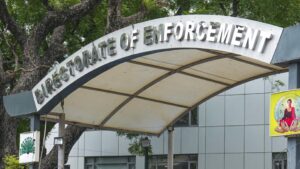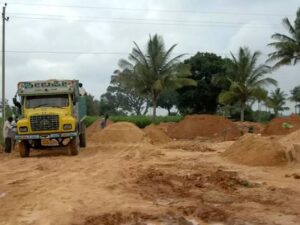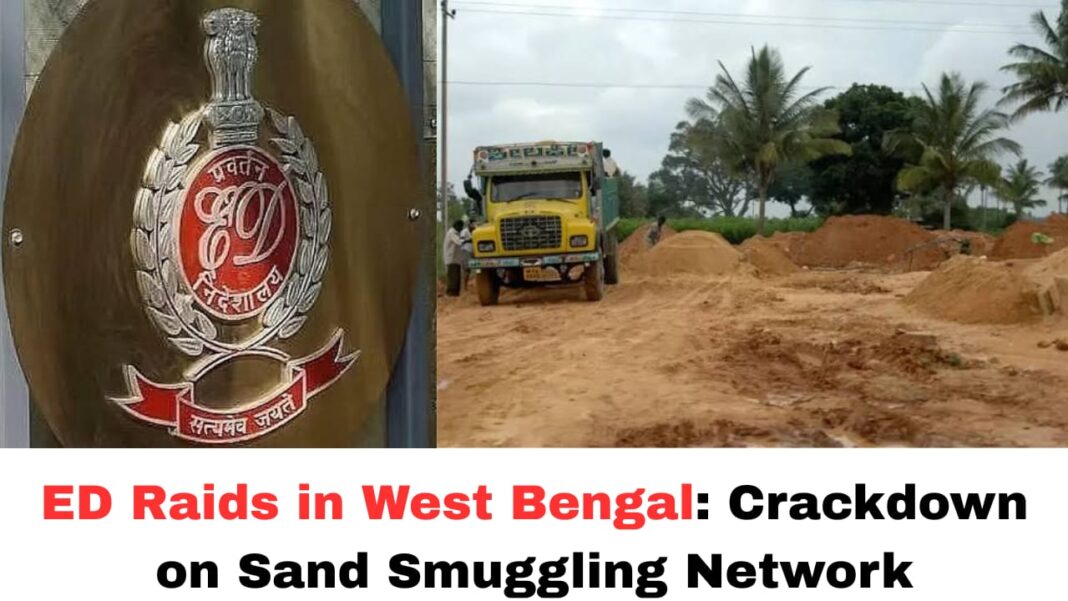Digital News Guru West Bengal Desk:
ED raids in West Bengal over sand smuggling
The Enforcement Directorate (ED) carried out coordinated raids at multiple locations across West Bengal targeting individuals and entities allegedly linked to a large-scale sand-smuggling and money-laundering racket.
The Raids: Where and Whom
The search operations were launched in the early hours across at least seven to eight locations in the state. Among the primary targets:

- Offices in Kolkata’s Bentinck Street area were raided.
- A sand mine belonging to Sourav Roy in Lalgarh (Jhargram district) was searched.
- Other raids occurred in Gopiballavpur (Jhargram district) and in Asansol (Paschim Bardhaman district), including the residence of sand trader Manish Bagaria (sometimes spelled Bagadia / Bagaria) in the Murgashol area.
- Plans also included searches of business premises linked to the sand trade in these regions.
According to sources, some raided quarries were still active; trucks loaded with sand were found parked on site.
This operation is not entirely novel: On September 8, the ED conducted simultaneous raids in more than 20 locations in West Bengal tied to the same sand mining and money laundering investigation. During that earlier raid, approximately Rs 90 lakh in cash was seized across several premises — Rs 25 lakh from the home of Sheikh Jahirul Ali in Jhargram and Rs 64 lakh from Sourav Roy’s house in Midnapore.
Allegations & Investigation Focus
The ED’s current action aims to unravel the financial underpinnings of the alleged racket. Key areas under scrutiny include:
- Business records, financial transactions, and properties owned by the suspects.
- Suspected money laundering channels used to convert illicit gains from sand trade into legitimate assets.
- Irregularities in permits and ghats: Allegations suggest the use of forged mining permits or misuse of government-issued sand ghats.
- Revenue diversion: The racket is believed to have undervalued government revenue, with sand being sold at inflated rates in open markets.
One senior official described the raids as part of a larger push against illegal sand mining, stating that these coordinated searches are intended to dismantle entrenched networks.

Key Individuals & Their Roles
Among the figures under scrutiny:
- Sourav Roy: A businessman whose sand mine in Lalgarh was raided and whose earlier premises were among those from which cash was seized in the September raids.
- Sheikh Jahirul Ali: Previously identified as a central figure in the Jhargram sand trade, with connections to multiple mining sites along the Subarnarekha River.
- Manish Bagaria / Bagadia: A local sand trader in Asansol; his residence and business premises are under investigation for alleged illicit financial activity.
The investigations suggest these individuals orchestrated a web of operations spanning several districts, with multiple quarries, ghats, and transport networks involved.
Stakes & Implications
The significance of these raids goes beyond punishing individual offenders. The case underscores broader issues:
- Environmental damage & illegal resource extraction: Unchecked sand mining is notorious for causing riverbank erosion, degradation of ecosystems, and disruption of local water tables.
- State revenue leakage: If mining permits are forged or traded illegally, the government may lose substantial royalty revenues.
- Entrenched criminal networks: The scale of the raids suggests that the sand trade in some areas is controlled by powerful individuals with deep financial and political connections.
- Precedent for financial accountability: By involving the ED, the government is signaling that natural-resource crimes will be traced through their money trail, not just the act of extraction.
Politically, the timing is sensitive. West Bengal is often a battleground for enforcement agencies’ activity, and opposition parties have in the past accused the central agencies of acting with political motives. Some critics may question whether such raids are triggered by electoral calendar pressures. (In earlier cases, such suspicions have been voiced when raids coincided with significant political events.)
However, central agency officials typically reject these charges, emphasizing that their operations follow legal process, intelligence inputs, and financial crime laws.

What Comes Next
At present, details on detentions, asset freezes, or recovered documents are still emerging. The ED’s immediate priority is to secure evidence — ledgers, transaction trails, property records — that can tie individuals to illicit proceeds.
If the investigation proceeds to prosecutions, key charges may include:
- Money laundering under PMLA (Prevention of Money Laundering Act)
- Violation of environmental and mining laws
- Forgery or fraud in permits / documents
- Financial irregularities in transport / ghats / permit issuance
The legal battles may take years, especially given how integrated such networks often are with local systems.
The ED’s raids in West Bengal today mark a serious escalation in the crackdown on illicit sand mining. Whether the operation yields convictions or just exposes large-scale financial misdeeds, it sends a message: natural-resource crimes will be pursued not just at the site of extraction, but through the banks and ledgers that enable them.
You May Also Read: Ahmedabad’s Moment: India’s Bid for the 2030 Commonwealth Games








